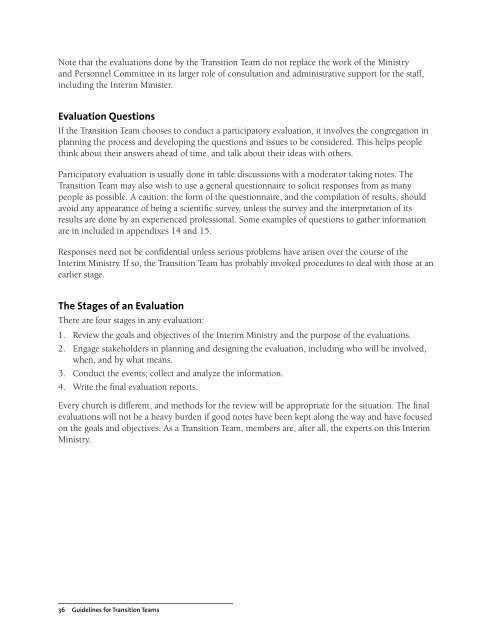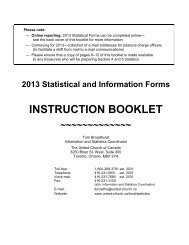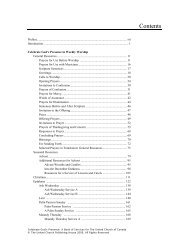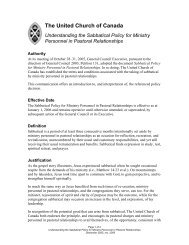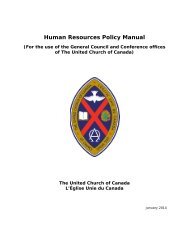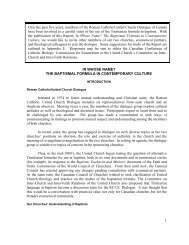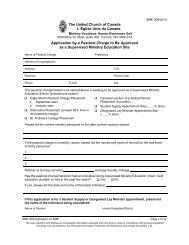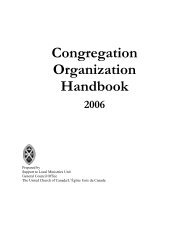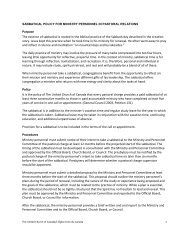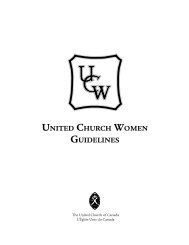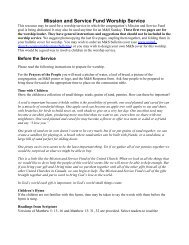Guidelines for Transition Teams - The United Church of Canada
Guidelines for Transition Teams - The United Church of Canada
Guidelines for Transition Teams - The United Church of Canada
You also want an ePaper? Increase the reach of your titles
YUMPU automatically turns print PDFs into web optimized ePapers that Google loves.
Note that the evaluations done by the <strong>Transition</strong> Team do not replace the work <strong>of</strong> the Ministry<br />
and Personnel Committee in its larger role <strong>of</strong> consultation and administrative support <strong>for</strong> the staff,<br />
including the Interim Minister.<br />
Evaluation Questions<br />
If the <strong>Transition</strong> Team chooses to conduct a participatory evaluation, it involves the congregation in<br />
planning the process and developing the questions and issues to be considered. This helps people<br />
think about their answers ahead <strong>of</strong> time, and talk about their ideas with others.<br />
Participatory evaluation is usually done in table discussions with a moderator taking notes. <strong>The</strong><br />
<strong>Transition</strong> Team may also wish to use a general questionnaire to solicit responses from as many<br />
people as possible. A caution: the <strong>for</strong>m <strong>of</strong> the questionnaire, and the compilation <strong>of</strong> results, should<br />
avoid any appearance <strong>of</strong> being a scientific survey, unless the survey and the interpretation <strong>of</strong> its<br />
results are done by an experienced pr<strong>of</strong>essional. Some examples <strong>of</strong> questions to gather in<strong>for</strong>mation<br />
are in included in appendixes 14 and 15.<br />
Responses need not be confidential unless serious problems have arisen over the course <strong>of</strong> the<br />
Interim Ministry. If so, the <strong>Transition</strong> Team has probably invoked procedures to deal with those at an<br />
earlier stage.<br />
<strong>The</strong> Stages <strong>of</strong> an Evaluation<br />
<strong>The</strong>re are four stages in any evaluation:<br />
1. Review the goals and objectives <strong>of</strong> the Interim Ministry and the purpose <strong>of</strong> the evaluations.<br />
2. Engage stakeholders in planning and designing the evaluation, including who will be involved,<br />
when, and by what means.<br />
3. Conduct the events; collect and analyze the in<strong>for</strong>mation.<br />
4. Write the final evaluation reports.<br />
Every church is different, and methods <strong>for</strong> the review will be appropriate <strong>for</strong> the situation. <strong>The</strong> final<br />
evaluations will not be a heavy burden if good notes have been kept along the way and have focused<br />
on the goals and objectives. As a <strong>Transition</strong> Team, members are, after all, the experts on this Interim<br />
Ministry.<br />
36 <strong>Guidelines</strong> <strong>for</strong> <strong>Transition</strong> <strong>Teams</strong>


